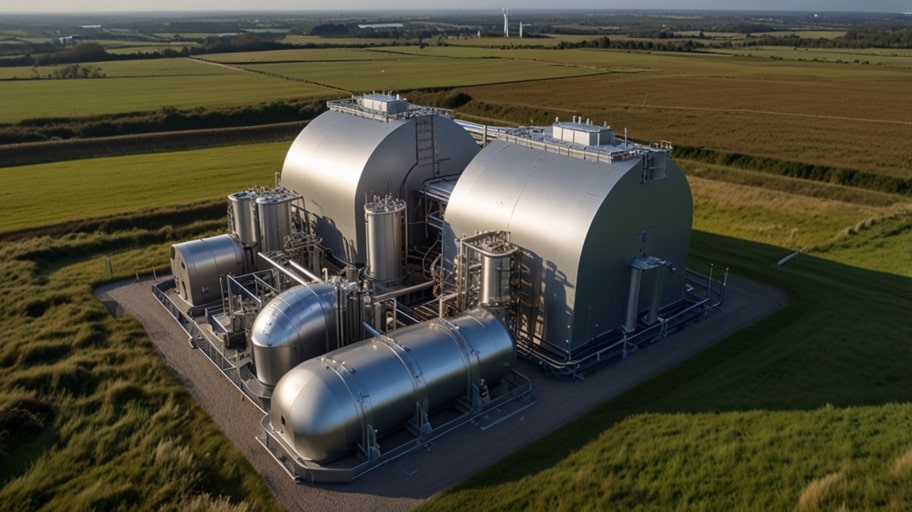
Rolls-Royce Leads UK’s Clean Energy Revolution
Rolls-Royce is stepping up its small modular reactor (SMR) programme, positioning the company as a major actor in the energy transition in the UK. Its advanced nuclear technology would provide clean and economical electricity, in line with the national net-zero targets.
SMR Technology Gains Traction
The firm’s SMRs (compact nuclear reactors) are intended to provide low-carbon and affordable energy. Compared to conventional reactors, SMRs are manufactured in factories, which lowers the cost and construction duration. Rolls-Royce is planning to roll out such units within the UK to help with grid stability and the decarbonization of industry.
The Support of the Government Stokes Development
The government has recently boosted Rolls-Royce’s nuclear aspirations. The UK is determined to achieve energy security through funding and policy incentives for the development of SMR. The firm also works with regulators to ensure that its designs incorporate high safety and environmental standards.
Economic Stimulus to the UK Regions
The Rolls-Royce SMR programme will generate several high-skilled jobs, especially in the north of England. Manufacturing centers and supply chains will spur local economies. The company’s regional development strategy coincides with the government’s levelling-up agenda, improving the community’s chances.
International Market Potentialities
Together with the UK, Rolls-Royce has its sights set on international markets with its SMR technology. Potential customers are countries that want to find a reliable green energy solution. The firm’s engineering and nuclear innovation capabilities can enable it to get a sizable portion of this new international industry.
Difficulties Associated with Scaling Up
Though promising, scaling SMR production still requires regulatory approvals, financing, and acceptance by people. Rolls-Royce is spending quite a lot on stakeholder engagement activity to help allay those fears and gain confidence in its advanced nuclear technology.
Increase in the Competitive Landscape
The international SMR supremacy rivalry is warming up, as rivals in the US and China proceed with design progress. Rolls-Royce’s advantage will depend on its capability to perform within the cost and timeframe pledges. Innovation and strategic partnering are the way forward in this dynamic industry.
IN FOCUS Environment
SMRs will provide low-carbon, fossil-free power, decreasing greenhouse gas emissions. Rolls-Royce insists on sustainability, and it plans to reduce waste and increase reactor efficiency. Instead, environmentalists demand strict control over such activities to guarantee ecological security in the long run.
Investor Confidence Grows
The nuclear drive at Rolls-Royce has given investors confidence, and the stock market is indicating confidence in the company’s diversified portfolio. The SMR programme helps to balance its aerospace and defence divisions, making it less dependent on fluctuating markets. Analysts forecast a gradual increase with the development of nuclear projects.
Workforce Development Initiatives
To address SMR needs, Rolls-Royce is investing in training programmes to create a skilled workforce. Collaborations with Universities and technical colleges will develop talents in nuclear engineering. This emphasis will help the company maintain its aggressive expansion strategies.
Deployment Schedule
Rolls-Royce aims to have operational SMRs by the early 2030s and has pilot projects in development. If successfully tested, it could speed up deployment and revolutionise the energy scene in the UK. The company’s path depends on regulatory achievements and continued governmental assistance.
An Energy Security Vision
The Rolls-Royce SMR project is an ambitious attempt to make the UK energy independent. The company is looking to change the role of nuclear power in a sustainable future by incorporating innovation and practicality. Its success may declare a new age of clean energy worldwide.



 Bitcoin
Bitcoin  Ethereum
Ethereum  Tether
Tether  XRP
XRP  USDC
USDC  TRON
TRON  Lido Staked Ether
Lido Staked Ether  Cardano
Cardano  Avalanche
Avalanche  Toncoin
Toncoin  Wrapped SOL
Wrapped SOL